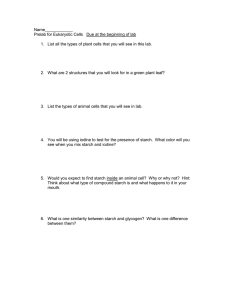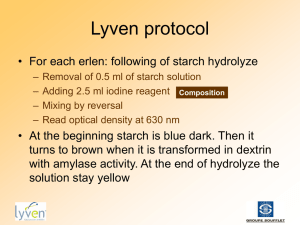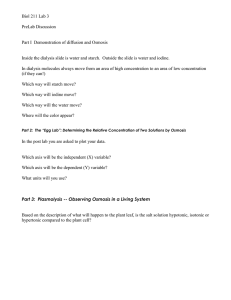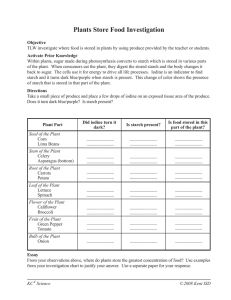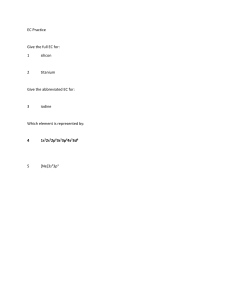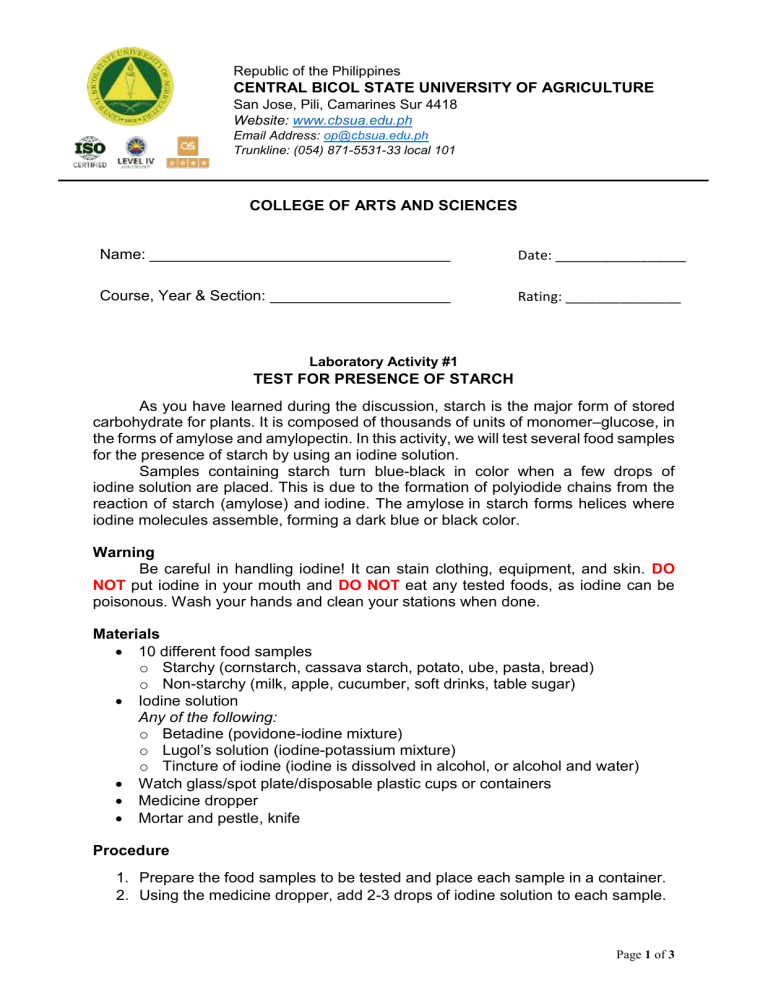
Republic of the Philippines CENTRAL BICOL STATE UNIVERSITY OF AGRICULTURE San Jose, Pili, Camarines Sur 4418 Website: www.cbsua.edu.ph Email Address: op@cbsua.edu.ph Trunkline: (054) 871-5531-33 local 101 COLLEGE OF ARTS AND SCIENCES Name: ___________________________________ Date: _________________ Course, Year & Section: _____________________ Rating: _______________ Laboratory Activity #1 TEST FOR PRESENCE OF STARCH As you have learned during the discussion, starch is the major form of stored carbohydrate for plants. It is composed of thousands of units of monomer–glucose, in the forms of amylose and amylopectin. In this activity, we will test several food samples for the presence of starch by using an iodine solution. Samples containing starch turn blue-black in color when a few drops of iodine solution are placed. This is due to the formation of polyiodide chains from the reaction of starch (amylose) and iodine. The amylose in starch forms helices where iodine molecules assemble, forming a dark blue or black color. Warning Be careful in handling iodine! It can stain clothing, equipment, and skin. DO NOT put iodine in your mouth and DO NOT eat any tested foods, as iodine can be poisonous. Wash your hands and clean your stations when done. Materials 10 different food samples o Starchy (cornstarch, cassava starch, potato, ube, pasta, bread) o Non-starchy (milk, apple, cucumber, soft drinks, table sugar) Iodine solution Any of the following: o Betadine (povidone-iodine mixture) o Lugol’s solution (iodine-potassium mixture) o Tincture of iodine (iodine is dissolved in alcohol, or alcohol and water) Watch glass/spot plate/disposable plastic cups or containers Medicine dropper Mortar and pestle, knife Procedure 1. Prepare the food samples to be tested and place each sample in a container. 2. Using the medicine dropper, add 2-3 drops of iodine solution to each sample. Page 1 of 3 3. Observe any change in color. Observations/Guide Questions Complete the table below using the food your group has compiled. When drops of iodine solution are applied to food containing starch, the solution will turn dark blue, purple, or blackish. Food Sample Description before testing Description after testing Conclusion: Is starch present? 1. 2. 3. 4. 5. 6. 7. Page 2 of 3 8. 9. 10. What principle is involved in the iodine test for starch? How will you explain the reason for the change in color of food samples? ___________________________________________________________________ ___________________________________________________________________ ___________________________________________________________________ ___________________________________________________________________ ___________________________________________________________________ ___________________________________________________________________ ___________________________________________________________________ ___________________________________________________________________ ___________________________________________________________________ ___________________________________________________________________ ___________________________________________________________________ _____________ Conclusion/Generalization ___________________________________________________________________ ___________________________________________________________________ ___________________________________________________________________ ___________________________________________________________________ ___________________________________________________________________ ___________________________________________________________________ ___________________________________________________________________ ___________________________________________________________________ ___________________________________________________________________ ___________________________________________________________________ ___________________________________________________________________ _____________ Page 3 of 3
